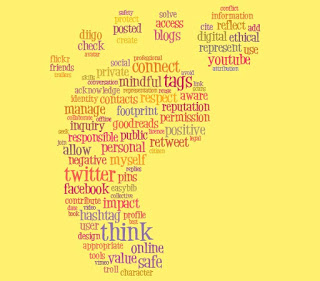There is no doubt that considering how Social Media is used by ALL members of a school community (students, staff, parents) is essential in our digital age. Often, we may find that staff can be just as prone to misusing (either intentionally or unintentionally) social media as students. While many organisations are drafting policies to cater for the use of social media by their representatives, I believe, particular in schools, that we must begin with educating community members about Digital Citizenship in conjunction with any policy creation regarding online behaviours.
I was at a BBQ last week and the ideas of teaching Digital Citizenship and using Social Media in class were mentioned. I was interested that many attendees scoffed at the idea of teaching this in schools and believed that this was something of a joke, with one person commenting that, “no one ever taught us to socialise at school and we turned out just fine”, and another suggesting that, “if schools didn’t encourage their students to be online they wouldn’t have a problem”. Unfortunately, I think many parents have this same mindset when it comes to Digital Citizenship and Social Media, often believing that whatever will happen online will happen, regardless of what they are taught, or, they won’t have a problem if they prohibit their children from being online.
This Science Friday podcast provides some real insight into the ‘why’ behind teaching Digital Citizenship in schools, as it suggests that teenagers have always needed to learn how to control social situations and being online should be no different. We have always focused on ‘personal development’ in schools where we have modelled appropriate behaviours in social situations, we shouldn’t ignore that much of this socialisation has now moved beyond physical situations to online situations. Thus, I believe that as educators it is our responsibility to create awareness of what it means to be a digital citizen and model this behaviour, not only for our students, but also for their parents, our peers and wider community.
One thing we often overlook when we consider Digital Citizenship, is that we are not only teaching students how to be appropriate in their socialisation online, we are also teaching them how to be ethical and legal online. It is essential for people to realise that as soon as they post something online they are becoming both a copyright holder and publisher, hence, they need to consider how they are branding themselves personally and professionally. In the video below, Barry Britt discusses the importance of students and teachers understanding the impact that their interactions and posts online can have on their personal and professional profiles. Essentially, he suggests that we need to ensure both students and teachers have the knowledge to make decisions about branding rights.
Another important consideration concerning Digital Citizenship is catering for ‘context collapse’. In her book It’s Complicated, Danah Boyd asserts that teenagers today are not doing anything different to what they have always done; the problem with the emergence of social media is that now the whole world can see how they are socialising. Thus, they need to be aware of ‘context collapse’ – if they don’t understand the context in which they are operating online, their behaviour will often be misrepresented. A teacher mentioned to me the other day that she was annoyed students had started following her on Twitter as she wanted to use it as a personal account. This is a perfect example of ‘context collapse’ as this teacher obviously didn’t understand the social context around Twitter, highlighting the growing need for awareness around Digital Citizenship and the use of social media.
Digital Citizenship involves accepting that we need to interact online and brand and promote ourselves in a positive manner. We must accept that we need to learn to control our social situations online, just as much as we do in a physical setting. Thus, if we begin a Digital Citizenship education in conjunction to creating policy around Social Media use, we may find that community members are more aware of and informed of acceptable online behaviours.
